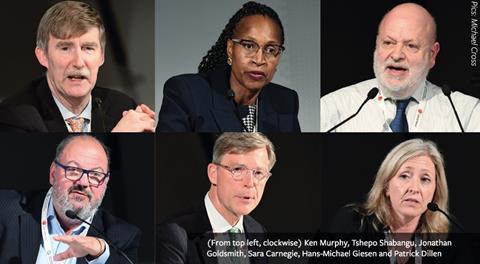Proposals on whether lawyers need further guidance when deciding whether to act for controversial clients sparked heated debate - many bars are highly sceptical
A client wants it. It is legal. What’s the problem? Potentially, there are many, given current attacks on the role of lawyers in areas ranging from tax planning to strategic litigation to fossil fuel exploitation. The question of whether lawyers need new rules to help them decide whether to act in such matters was the topic of one of the most heated debates at this year’s IBA conference.
The immediate controversy concerned the adoption of a proposed addition to Principle 5 of the IBA International Principles on Conduct for the Legal Profession. These are designed to deliver a ‘generally accepted framework’ for the setting out of codes of conduct. Principle 5 opens with the words ‘A lawyer shall treat client interests as paramount’, subject to caveats on observing the law and duties to the courts and ethical standards.
The amendment emerged from an IBA project to examine the role of lawyers as ‘ethical gatekeepers within wider society’. It questions whether a lawyer’s ethical behaviour should be shaped purely by conformity to their client’s interest without proper attention being paid to wider responsibilities. Noting ‘increasing scrutiny of the role of lawyers from a range of influential global organisations and decision-makers’, it suggests that lawyers ‘consider the principle that their obligations to the interests of justice and the rule of law may take precedence over the interests of the individual client’.
It is fair to say that the amendment has prompted controversy. ‘I’m surprised to see the fury that has come out of this,’ Sara Carnegie, leader of the gatekeeper project, said. And in an unusual preamble to an IBA debate, chair Ken Murphy, former director general of the Law Society of Ireland, appealed for delegates to listen to arguments from outside their own echo chambers. He was respected, but passions evidently ran high.

Setting out (in a personal capacity) the need for the amendment, Jonathan Goldsmith, a Law Society council member and Gazette columnist, warned of looming government intervention. ‘This is an international problem and if we don’t deal with it ourselves, others will do it for us,’ he said.
However Patrick Dillen of the Brussels bar described the proposed amendment as vague and open to abuse. ‘If we had a rule which said “you are not taking this case because of a vague social norm”, it would be very dangerous,’ he said. ‘It should be for the individual lawyer and their conscience.’
'The IBA is powerful when it gives expression to a firm consensus, but if you are speaking on an issue where there is not one voice, in these circumstances it’s time to say nothing'
Nick Vineall KC
From Germany, former Freshfields partner Hans-Michael Giesen agreed that the profession has ‘a reputational problem’. The question is what to do with it – and whether this is a role for bar associations. ‘I would be very uncomfortable about someone outside [the lawyer-client] relationship telling me what is right and what is wrong,’ he said. The decision should be one for the individual professional.
Tshepo Shabangu, an IP lawyer in Pretoria, suggested that, while ‘we are not judges of morality’, a lawyer’s duty might be to advise their client of the wider impact of their advice. In a tax avoidance matter, for example, ‘a lawyer could say “legally this is fine, but think of the social impact and the reputational damage of exploiting that loophole”.’
Speakers from the floor suggested that the proposed amendment was too ambitious in its global reach, particularly in jurisdictions with split professions.
‘This isn’t a one-size-fits-all issue,’ said Irish bar chair Sara Phelan. ‘To address it by amendment to a principle that covers everyone is proving to be problematic.’ A representative of the German bar association agreed: ‘To try and put in place one rule that fits the 175 jurisdictions is maybe a project too big.’
England and Wales bar chief Nick Vineall KC said he accepted that solicitors had a right to refuse to act for clients – ‘the real question is whether they have a duty.’ He warned of the danger of imposing additional obligations ‘when it is quite unclear what these obligations are’. Is this a job for the IBA? ‘A firm “no”,’ he said. ‘The IBA is powerful when it gives expression to a firm consensus, but if you are speaking on an issue where there is not one voice, in these circumstances it’s time to say nothing,’ he said to applause.
The draft, which was due to go before the IBA council this week, has now been withdrawn for further consideration. But the issue is not one that is going away.
This article is now closed for comment.
































2 Readers' comments